
German far right setting agenda as opponents amplify its ideas, study finds
18.10.2025 05:45 — 👍 442 🔁 236 💬 34 📌 125@simonbrause.bsky.social
PhD candidate in political science at Heinrich Heine University Düsseldorf, Germany @hhu_de | focus on opposition parties, party competition and representation

German far right setting agenda as opponents amplify its ideas, study finds
18.10.2025 05:45 — 👍 442 🔁 236 💬 34 📌 125
Third dissertation paper is out now in @govandopp.bsky.social!
OA: www.cambridge.org/core/journal...
It studies the ideological structure of European electorates – finding broad similarities between countries, despite that party electorates and social groups remain structured nationally


Das war unsere diesjährige #AKPF Tagung in der Landesvertretung #RheinlandPfalz in #Berlin - mit einem Rekord von 6 Panels, 18 Vorträgen & einem Gespräch mit SPD-Generalsekretär Tim Klüssendorf. 💡 Danke an alle Teilnehmenden & bis zum 8./9.10.2026 in Berlin! @akpf-dvpw.bsky.social @dvpw.bsky.social
09.10.2025 14:21 — 👍 21 🔁 8 💬 1 📌 0

How well are young people represented along the recruitment ladder? The pipeline problem for the Danish youth is within parties, since they are eager to stand for election and well represented at the parliamentary level. New article out in @ecpr.bsky.social's EPS. Open access: rdcu.be/eIiM1.
26.09.2025 11:30 — 👍 10 🔁 5 💬 1 📌 1
Call for the 17th Düsseldorf Graduate Conference on Party Research #GraPa2026. Application deadline: 17.11.25
@hhu.de @ecprsgpp.bsky.social @sgparliaments.bsky.social
www.pruf.de/fileadmin/re...
I am looking for a PhD student in Comparative Politics @powimz.bsky.social. My research focuses on political (in-)equality, representation, and responsiveness. I would be grateful if you could help to spread the word.
stellenboerse.uni-mainz.de#/jgu/job/49637
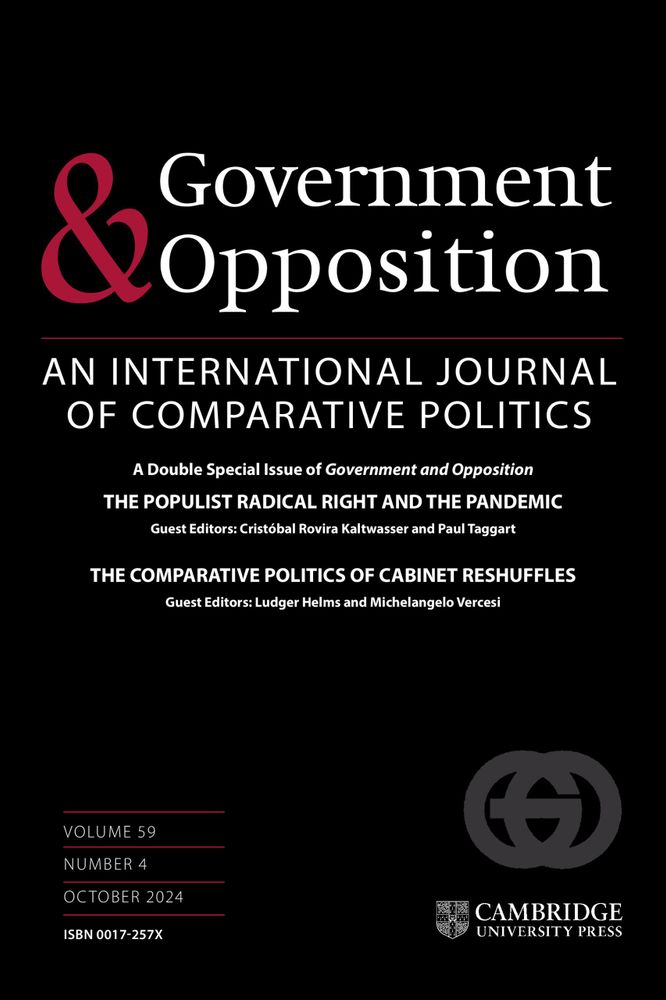
🧵 New article out in @govandopp.bsky.social ! Why do opposition parties sometimes support government legislation? Should they not be, well... opposing? I analysed 75 years of parliamentary votes in 4 parliamentary democracies. Here is what I found👇🔗 cup.org/3JeLkw4
04.08.2025 06:02 — 👍 14 🔁 8 💬 1 📌 12024 was a turbulent year in German politics: four elections, a surging far right, and the coalition's collapse. Our new Political Data Yearbook piece (with @lucykinski.bsky.social) traces the events leading to the 2025 snap elections.
@hhu.de @sceus.bsky.social
Danke für den Ohrwurm.
19.06.2025 09:40 — 👍 0 🔁 0 💬 0 📌 0Our book is out and available to read open access online: academic.oup.com/book/60532. It is dedicated to Niko.
17.06.2025 08:50 — 👍 71 🔁 32 💬 3 📌 0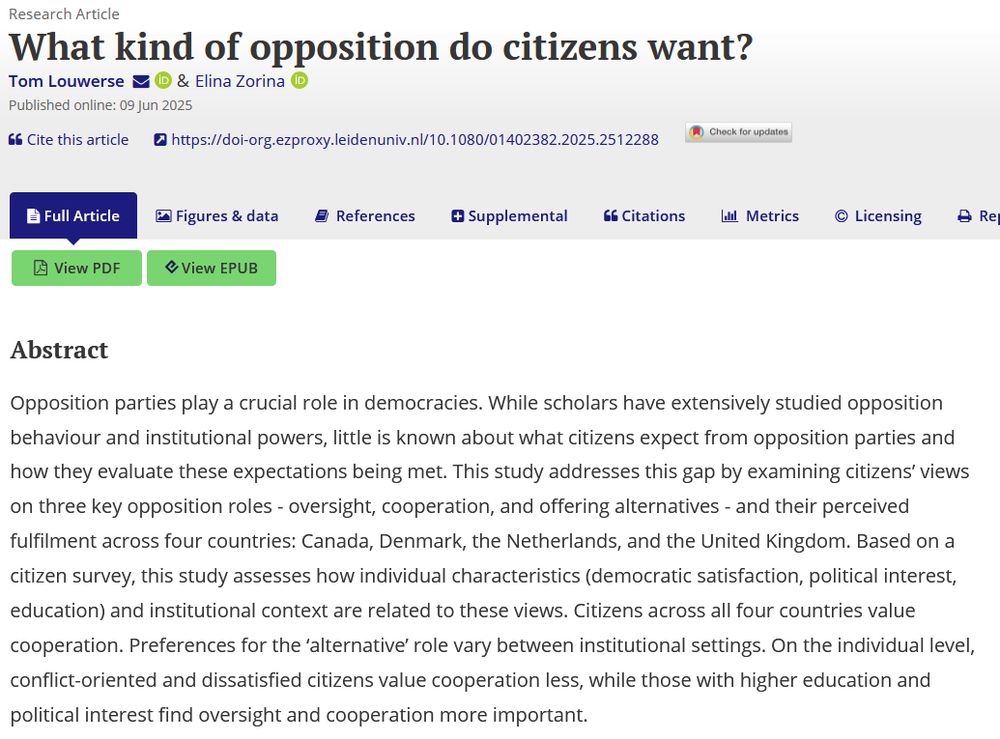
What kind of opposition do citizens want? Abstract Opposition parties play a crucial role in democracies. While scholars have extensively studied opposition behaviour and institutional powers, little is known about what citizens expect from opposition parties and how they evaluate these expectations being met. This study addresses this gap by examining citizens’ views on three key opposition roles - oversight, cooperation, and offering alternatives - and their perceived fulfilment across four countries: Canada, Denmark, the Netherlands, and the United Kingdom. Based on a citizen survey, this study assesses how individual characteristics (democratic satisfaction, political interest, education) and institutional context are related to these views. Citizens across all four countries value cooperation. Preferences for the ‘alternative’ role vary between institutional settings. On the individual level, conflict-oriented and dissatisfied citizens value cooperation less, while those with higher education and political interest find oversight and cooperation more important.
🧵 New research on what citizens expect from opposition parties in democracy published in @wepsocial.bsky.social. @elinazorina.bsky.social and I surveyed people in Canada, Denmark, Netherlands & UK to understand their views on opposition roles. doi.org/10.1080/0140...
09.06.2025 18:36 — 👍 49 🔁 17 💬 1 📌 3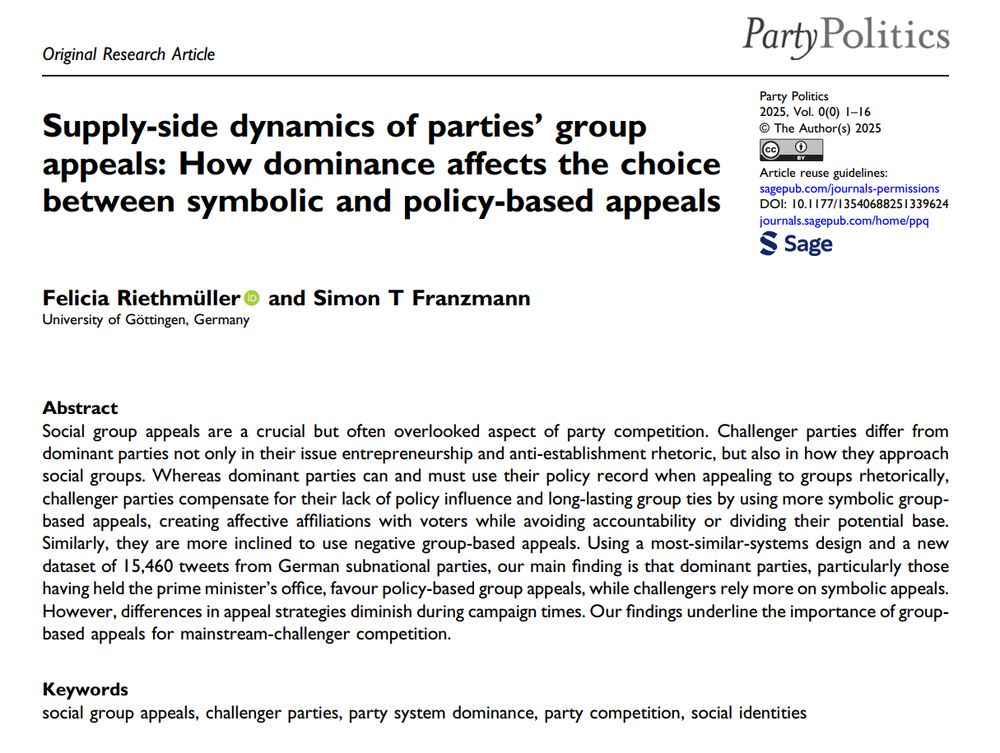
Abstract Social group appeals are a crucial but often overlooked aspect of party competition. Challenger parties differ from dominant parties not only in their issue entrepreneurship and anti-establishment rhetoric, but also in how they approach social groups. Whereas dominant parties can and must use their policy record when appealing to groups rhetorically, challenger parties compensate for their lack of policy influence and long-lasting group ties by using more symbolic groupbased appeals, creating affective affiliations with voters while avoiding accountability or dividing their potential base. Similarly, they are more inclined to use negative group-based appeals. Using a most-similar-systems design and a new dataset of 15,460 tweets from German subnational parties, our main finding is that dominant parties, particularly those having held the prime minister’s office, favour policy-based group appeals, while challengers rely more on symbolic appeals. However, differences in appeal strategies diminish during campaign times. Our findings underline the importance of groupbased appeals for mainstream-challenger competition.
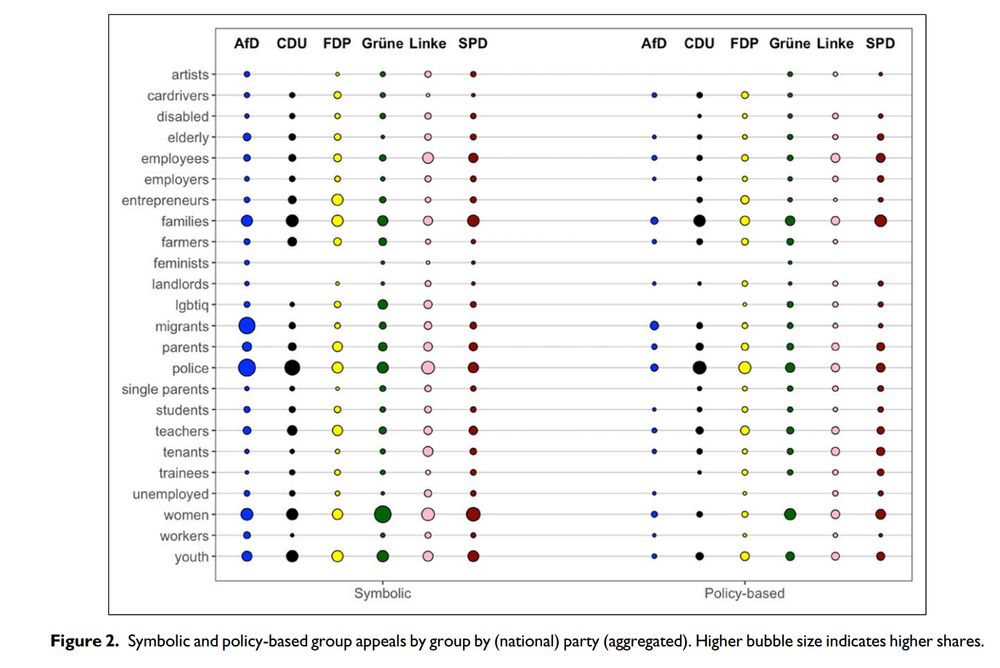
Thrilled to see my 1st PhD paper out in #PartyPolitics! Based on ~15000 posts by 86 German subnat. parties (2015-2019), Simon Franzmann & I show that dominant & challenger parties differ in the use of policy-based vs symbolic & positive vs negative appeals.
🔓:
doi.org/10.1177/1354...
5/ We thank the anonymous reviewers and Camila Montero for their excellent feedback and Paul Sax for his great help with the manuscript.
#ComparativePolitics #PoliticalParties #IntraPartyDemocracy #PPDB #PoliticalScience #polsky
4/ 📍 Access the article here:
doi.org/10.1177/1354...
📊 Access the data here:
doi.org/10.7910/DVN/...
3/ This new release enables:
• Comparative analysis across political systems
• To study changes of intra-party democracy
• Research into democratization, party competition, and organizational dynamics
2/ The dataset builds on the second round of the Political Party Database Project (PPDB) and covers 274 parties across 51 countries, including new regions in Africa, Latin America, and Central & Eastern Europe.
16.04.2025 07:37 — 👍 0 🔁 0 💬 1 📌 0🧵 New comparative data on intra-party democracy is now available. Thomas Poguntke and I present our recent research note ow two indices—assembly-based and plebiscitary IPD—applied globally for the first time. A resource for research on political parties, democracy, and representation. @hhu.de
16.04.2025 07:37 — 👍 13 🔁 2 💬 1 📌 1
⭐I am looking for 2 PhD candidates w/ focus on qualitative representation research in my ERC project INCONEX at University of Salzburg!
On the project: sites.google.com/view/inconex...
Applications due: 2 May 2025
Full ad: sites.google.com/view/inconex...
#EUsky #poliscijobs #qualitativemethods
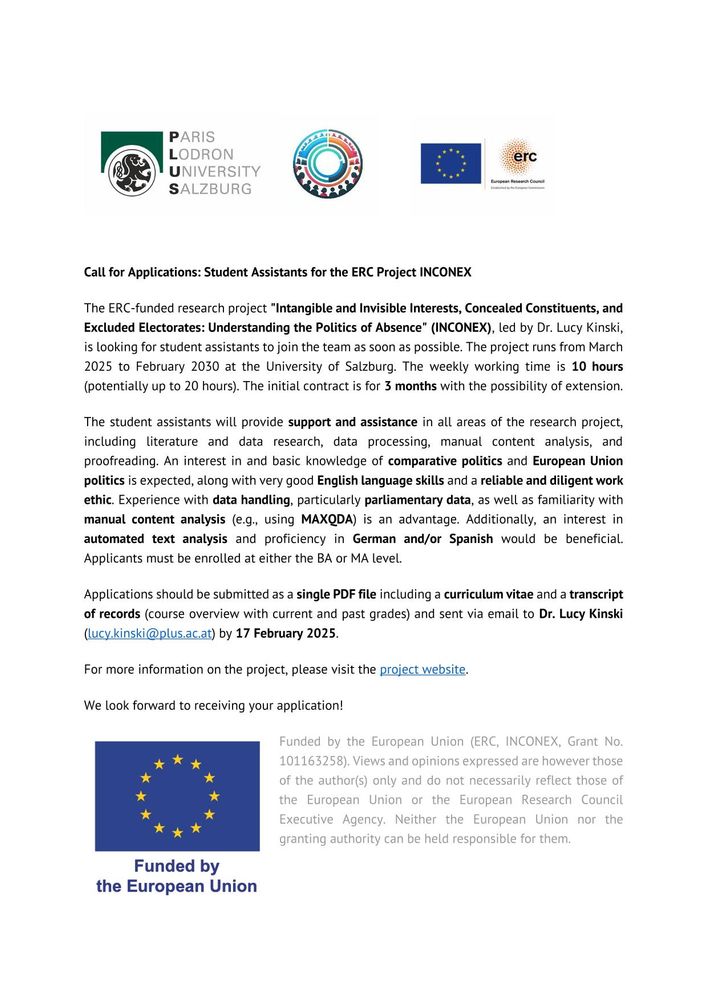
📢I am looking for a student research assistant in my ERC project INCONEX to join the team as soon as possible!
⭐More information below and here: sites.google.com/view/inconex...
@sceus.bsky.social

⭐I am looking for a Postdoc in Computational Social Science in my ERC project INCONEX at University of Salzburg!
More on the project: sites.google.com/view/inconex...
Applications due by 8 January 2025.
Full ad: sites.google.com/view/inconex...
#EUsky #poliscijobs #computationalsocialscience
Happy to have contributed with an article on populist party responsiveness & populist party voter satisfaction with democracy in Europe with @simonbrause.bsky.social
04.11.2024 11:33 — 👍 3 🔁 1 💬 0 📌 0Thanks to our colleagues @hhu.bsky.social @sceus.bsky.social , the editors, reviewers for helpful comments. Thanks to @koljaknodel.bsky.social & Paul Sax for the support with the data collection. Thanks to ULB Düsseldorf for the open access funding (5/5)
09.09.2024 08:13 — 👍 3 🔁 0 💬 0 📌 0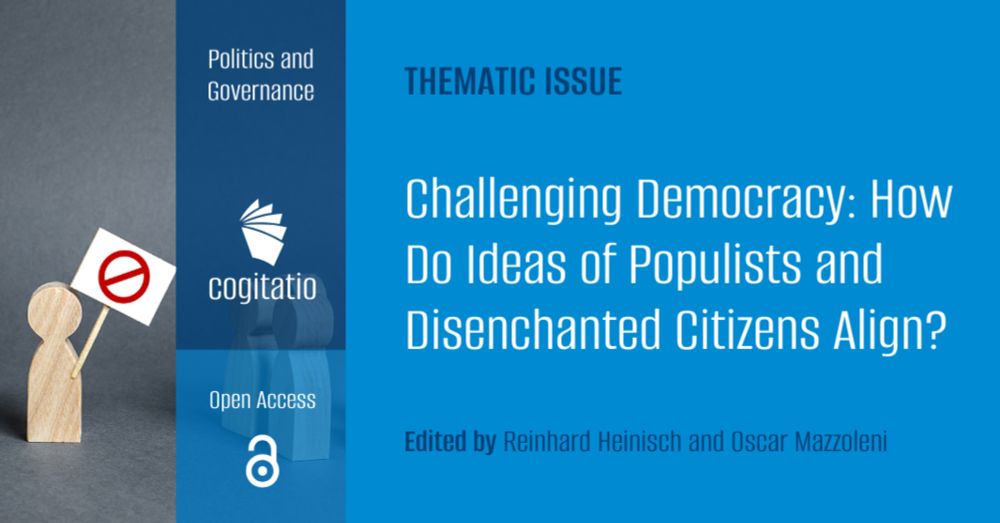
This article is part of the issue “Challenging Democracy: How Do Ideas of Populists and Disenchanted Citizens Align?” edited by Reinhard Heinisch & Oscar Mazzoleni, #openaccess doi.org/10.17645/pag... (4/5)
09.09.2024 08:11 — 👍 2 🔁 0 💬 1 📌 0We find that populist parties in Europe are NOT generally more responsive to populist party voters than mainstream parties. Populist parties’ agenda‐responsiveness boosts voters’ SWD, yet being in government does not enhance this positive effect (3/5)
09.09.2024 08:09 — 👍 2 🔁 0 💬 1 📌 0We investigate (1) how well populist parties represent populist party voters (issue-based responsiveness) & (2) link this responsiveness to their voters’ satisfaction with democracy (SWD) in 21 countries for the 2019 EP elections (2/5)
09.09.2024 08:09 — 👍 2 🔁 0 💬 1 📌 0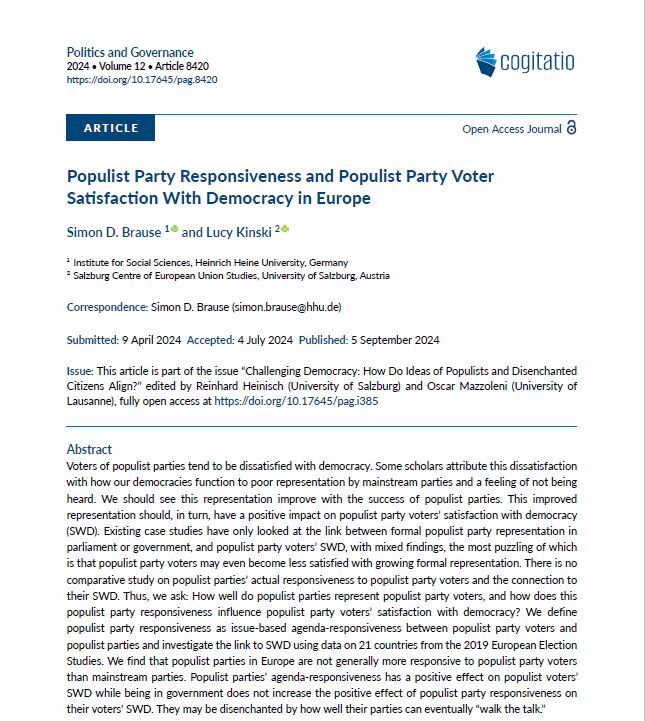
Pleased to share our recent article with @lucykinski.bsky.social in Politics and Governance on Populist Party Responsiveness and Populist Party Voter Satisfaction With Democracy in Europe #populism #responsiveness #democracy #EU doi.org/10.17645/pag... (1/5)
09.09.2024 08:09 — 👍 4 🔁 2 💬 1 📌 1